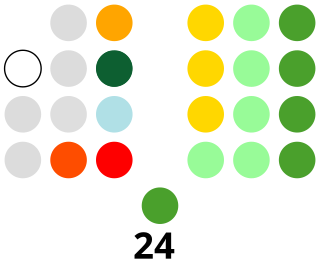
Cloture, closure or, informally, a guillotine, is a motion or process in parliamentary procedure aimed at bringing debate to a quick end.

A quorum is the minimum number of members of a group necessary to constitute the group at a meeting. In a deliberative assembly, a quorum is necessary to conduct the business of that group. According to Robert's Rules of Order Newly Revised, the "requirement for a quorum is protection against totally unrepresentative action in the name of the body by an unduly small number of persons." In contrast, a plenum is a meeting of the full body. A body, or a meeting or vote of it, is quorate if a quorum is present.

The Congress of the Philippines is the legislature of the national government of the Philippines. It is bicameral, composed of an upper body, the Senate, and a lower body, the House of Representatives, although colloquially, the term "Congress" commonly refers to just the latter. The Senate meets at the GSIS Building in Pasay, while the House of Representatives meets at the Batasang Pambansa in Quezon City, which also hosts joint sessions.
Congressional Debate is a competitive interscholastic high school debate event in the United States. The National Speech and Debate Association (NSDA), National Catholic Forensic League (NCFL) and many state associations and national invitational tournaments offer Congressional Debate as an event. Each organization and tournament offers its own rules, although the National Speech and Debate Association has championed standardization since 2007, when it began to ask its districts to use one of a number of procedures for qualification to its National Tournament.

The Foreign Intelligence Surveillance Act of 1978 is a United States federal law that establishes procedures for the surveillance and collection of foreign intelligence on domestic soil.

The Congressional Record is the official record of the proceedings and debates of the United States Congress, published by the United States Government Publishing Office and issued when Congress is in session. The Congressional Record Index is updated daily online and published monthly. At the end of a session of Congress, the daily editions are compiled in bound volumes constituting the permanent edition. Chapter 9 of Title 44 of the United States Code authorizes publication of the Congressional Record.
In United States parliamentary procedure, a discharge petition is a means of bringing a bill out of committee and to the floor for consideration without a report from the committee by "discharging" the committee from further consideration of a bill or resolution. The signatures of an absolute majority of House members are required.

The clerk of the United States House of Representatives is an officer of the United States House of Representatives, whose primary duty is to act as the chief record-keeper for the House.
The United States Senate has the authority for meeting in closed session, as described in the Standing Rules of the Senate.
The Standing Rules of the Senate are the parliamentary procedures adopted by the United States Senate that govern its procedure. The Senate's power to establish rules derives from Article One, Section 5 of the United States Constitution: "Each House may determine the rules of its proceedings ..."
An executive session is a term for any block within an otherwise open meeting in which minutes are taken separately or not at all, outsiders are not present, and the contents of the discussion are treated as confidential. In a deliberative assembly, an executive session has come to mean that the proceedings are secret and members could be punished for violating the secrecy.
The United States House of Representatives rarely meets in closed session.
Deliberative assemblies – bodies that use parliamentary procedure to arrive at decisions – use several methods of voting on motions. The regular methods of voting in such bodies are a voice vote, a rising vote, and a show of hands. Additional forms of voting include a recorded vote and balloting.
In parliamentary procedure, a motion is a formal proposal by a member of a deliberative assembly that the assembly take a particular action. These may include legislative motions, budgetary motions, supplementary budgetary motions, and petitionary motions.
The United States Senate Journal is a written record of proceedings within the United States Senate in accordance with Article I, Section 5 of the U.S. Constitution.
Each House shall keep a journal of its proceedings, and from time to time publish the same, excepting such parts as may in their judgment require secrecy; and the yeas and nays of the members of either House, on any question, shall, at the desire of one-fifth of those present, be entered on the journal.

The United States Senate is the upper chamber of the United States Congress. The United States Senate and the lower chamber of Congress, the United States House of Representatives, comprise the federal bicameral legislature of the United States. Together, the Senate and the House have the authority under Article One of the U.S. Constitution to pass or defeat federal legislation. The Senate has exclusive power to confirm U.S. presidential appointments to high offices, approve or reject treaties, and try cases of impeachment brought by the House. The Senate and the House provide a check and balance on the powers of the executive and judicial branches of government.

A filibuster is a tactic used in the United States Senate to delay or block a vote on a measure by preventing debate on it from ending. The Senate's rules place few restrictions on debate; in general, if no other senator is speaking, a senator who seeks recognition is entitled to speak for as long as they wish. Only when debate concludes can the measure be put to a vote.

Procedures of the United States Congress are established ways of doing legislative business. Congress has two-year terms with one session each year. There are rules and procedures, often complex, which guide how it converts ideas for legislation into laws.

In the United States, a federal impeachment trial is held as the second stage of the United States federal government's bifurcated (two-stage) impeachment process. The preceding stage is the "impeachment" itself, held by a vote in the United States House of Representatives. Federal impeachment trials are held in the United States Senate, with the senators acting as the jurors. At the end of a completed impeachment trial, the U.S. Senate delivers a verdict. A "guilty" verdict has the effect of immediately removing an officeholder from office. After, and only after, a "guilty" verdict, the Senate has the option of additionally barring the official from ever holding federal office again, which can be done by a simple-majority vote.

In the United States, federal impeachment is the process by which the House of Representatives charges the president, vice president, or another civil federal officer for alleged misconduct. The House can impeach an individual with a simple majority of the present members or other criteria adopted by the House according to Article One, Section 2, Clause 5 of the U.S. Constitution.











